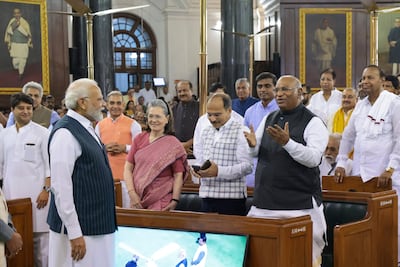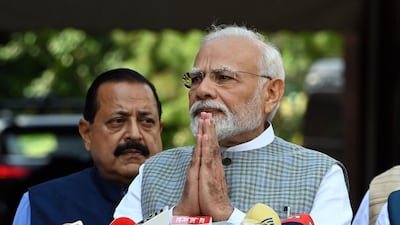Indian Prime Minister Narendra Modi's government has introduced the women’s reservation bill that proposes to reserve 33 per cent of seats in the lower house of the parliament for women.
Mr Modi listed the bill for discussion on Tuesday as proceedings began in the new parliament building on the second day of the special session.
The bill proposes 33 per cent of 543 seats in the Lok Sabha, the lower house of the parliament, and 1,370 seats of 4,109 seats in all state legislative assemblies are reserved for women.
It also proposes sub-reservation for Scheduled Castes and Scheduled Tribes.
“The dream of bringing the women reservation bill has remained unfulfilled so far but it seems God has chosen me for the pious task of empowering women,” Mr Modi said.
“The cabinet has approved the bill. Women are progressing in every sector. They’re leading everywhere so it is important that in policymaking also, our mothers, sisters … make maximum contribution and play a significant role,” he said.
Mr Modi urged the parliamentarians to pass the bill.

“I assure that we will make this bill into legislation. This will strengthen our democracy. I urge all the parliamentarians to unanimously pass the bill,” he said.
The bill was introduced in the parliament by Law Minister Arjun Singh Meghwal ahead of a discussion on Wednesday.
“This bill will give new direction to women-led development in new India,” Mr Singh said.
If passed, it will be fully implemented after 2027, after the census and delimitation exercises that will demarcate new boundaries for parliamentary and assembly constituencies in 2026.
Why is the bill significant?
The country of 1.4 billion, with half of the population women, has been pushing to increase female participation across India.
There are currently 78 female politicians in the lower house, about 14 per cent of the 543 members. Most state assemblies have 10 to 12 per cent women legislators, according to the government.
Supporters of the bill argue that women are underrepresented in the parliament and if there is a reservation for women parliamentarians then they will push for policymaking on issues related to women, which otherwise are often ignored.
When was it introduced?
The bill was first introduced in Lok Sabha in 1996 but it failed to get the approval of the house. It was later proposed in 1998, 1999, 2001, 2002 and in 2008.
It was passed in Rajya Sabha, the upper house of the parliament, in 2010 following two days of high-drama with marshals escorting some of the opposing politicians. The bill then lapsed after failing to be passed in the lower house.
The ruling Bharatiya Janata Party and the main opposition Congress party along with several parties of the opposition India bloc have supported the bill but some parties, particularly in eastern Bihar and Uttar Pradesh states, oppose the bill.
The government, which is holding a five-day special session of the parliament this week, held meetings with cabinet ministers late on Monday before introducing the bill in the parliament, Mr Modi said.
‘Rule by proxy’
Although the office of prime minister and president has been held by a woman in India, there have been limited roles. Female politicians are allegedly used as a proxy in a practice called “rule by proxy”.
In India’s village-level government system known as Panchayati Raj, 33 per cent of seats for women are reserved to increase their representation, but male politicians often circumvent the laws and appoint themselves as proxies.
One of the examples is Rabri Devi, former chief minister of the eastern state of Bihar, whose husband Lalu Prasad Yadav, also a former chief minister of the state and former federal railway minister, was found to be interfering despite being forced to resign after being implicated in a multi-million-dollar corruption operation in 1997.


